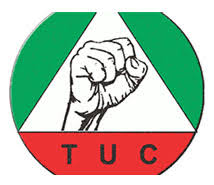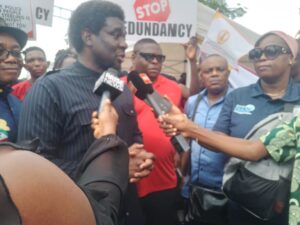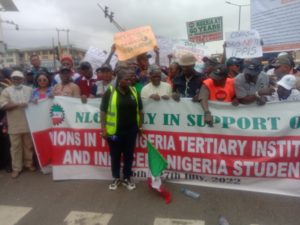Manufacturing sector has over 200 billion unsold stocks – Adewale Smatt-Oyerinde, NECA DG

As the Federal Government considers a wage increase award as a way to placate the Organised Labour and bring some succour to the workers, the Organised Private Sector (OPS) is looking beyond the implication on the business.
The Director General of the Nigeria Employers Consultative Association (NECA) warned that the palliatives would be neutralized if government fails to
address enterprise sustainability due to the high cost of doing business and the high cost of goods and services.
He laments that presently the manufacturing sector has over 200 billion unsold stocks, which may be aggravated with increase wages.
Adewale expressed displeasure in the government sidetracking members of OPS in relations to industrial issues that affects wages.
Noting that most sectors pay far above the national minimum wage, he maintained that as much as minimum wage increase is expedient, it may also create more unemployment.
Oyerinde speaks more on issue of forex exchange, foreign investment, national refineries and other national interests.
Excerpts:
Labour strike’s suspension
We commend the suspension of the strike, because we consistently advocated that the strike will not serve any significantly positive purpose from the perspective of the Organised Private Sector (OPS), rather it will probably leads us deeper in crisis, considering the state of the current economy and that of the organised private sector, which is also a big player within the context of all this conversation.
We had advocated for social dialogue as a way to go and we are glad that social dialogue trounced in the context of all these conversations so, it is a good news that the strike had been called off and we hope that each party including, government and Labour will live up to their obligations and commitments in the Memorandum of Understanding (MOU) that had been signed. The first step in in resolving the many issues that are still underlying in our industrialization system.
Removal of VAT on diesel
That is also commendable. It is part of the bouquet of requests that we sent to the federal government. The removal of fuel subsidy did not only affect the workers. It also has consequential or serious effect on us as organised businesses.
Diesel as you know is critical to powering the engines in the absence of power. VAT basically increases the cost of buying diesels which in turn also increase the cost of doing business, which may also affect the cost of production, which leads to increase in cost of goods and services.
So whatever increase that is allocated or that is awarded, or that is approved. If you do not deal with the enterprise side, the escalating costs of doing business, escalating cost of goods and services will neutralise whatever award that you are giving the employees and that is the reality. The removal of VAT as one of the steps to support the organised private sector is also welcomed.
Sidelining OPS
Now I think this is quite interesting. And it’s very important that we get the context very well. There is what we call bi-partisan and the tri-partisan in the context of negotiation and engagement.
Both are legal and valid in the context of that engagement. Bipartisan can be between government and Organized Labour which have gone on for a long time. And it is expected that the conversation in that bipartite meeting could be issues that concerns you and me.
Now when it comes to tri-partisan, that means the issue is expanded to include issues that concerns each of us. If I am not there, you cannot decide on my behalf. You cannot understand my priorities more than myself. Within the context of bipartisan, during COVID for instance, employers entered into an MOU with Labour to say that during this period, employers will not downsize, to do whatever is necessary to make sure that they do not release staff, and that MOU was signed.
Government was not involved in that discussion because it was between the OPS and organised Labour. The moment we drag in the federal workers or state workers, then you will be compelled to bring in government into that conversation then that becomes tri-partisan.
So bipartisan is a beautiful global practice, which is allowable and has aso supported conversations between government and organise labour on issues.
The conversation was held and when the MOU came out, we start seeing the commendation for the private sector. And that is a concern. It was not the content alone, but the process that led to it.
And I think it is very important that we started getting processes right because you cannot build a very beautiful house on a very faulty foundation, it will not work. If it is going to be a conversation that will involve the employers’ interest, then they should be called to be part of that conversation. Organised labour is not an affiliate of the employers, so we cannot speak expressly for them.
Organized Businesses is also not an appendage or affiliate of Labour, so they cannot speak expressly for us. Therefore, in the context of our priorities and what we want government to address: while the removal of 7.5 per cent on VAT is appreciated, may not be the most important.
More so, if you do not address enterprise sustainability, whatever palliatives that you give would be neutralised by the high cost of doing business and the high cost of goods and services. That is why we insist that you must address the two issues concurrently. As you are addressing the income side you are also addressing the production side so that they do not neutralise each other.
Satisfaction is comparative. We are happy that those issues were brought on board, but we believe much more must be done to meet our priorities. For instance, the issue of VAT will probably not be considered our priorities.
OPS priorities
First is the issue of multiple taxation. Also, in August, the President mentioned definitively that N75 billion would be earmarked for big manufacturing enterprises, while another would be earmarked for medium and small businesses.
One of our priorities would be definitive timelines of when the fund will be released. Also, you cannot plan effectively when the issue of forex continues to escalate.
Now, we would situate the issue of removal of 7.5 percent on VAT within the context of what government should do as a way of ameliorating the challenges faced by Nigerians. The removal of VAT is commendable because it reduces the burden of transportation, making it easier for all Nigerians, it makes transportation easier for employer-employees, it makes running of diesel generators easier for employers also. It is not an employer-focused intervention, it is for all Nigerian and we think government has done well in that regard.
Govt. Six months intervention
As organized businesses, we are not privy to the conversation between labour and government which led to the 6-months agreement. Within this time, employers would also bear the consequences, and after this, what happens. When we were doing the welfare intervention for employees, we did not put a caveat to it, but now we have been dragged into the fray of a 6-month intervention between labour and government.
Are we anticipating that the refinery in Port Harcourt would start working by December as promised by the President? Would it reduce the price of petrol? We also have Dangote refinery that we expect to be producing before December too, and then what would be its impact given that it is in a free trade zone where it is subject to sell international price. And would the nations refinery be in direct competition with that of Dangote? All these questions beget answers. These are our major concerns. As government, in making one policy decision, you must take a look at the impact of that decision in other areas.
The government has introduced a wage award, however, the cost of doing business continues to and as you increase wages, the cost of production will also lead to a likely increase in stock. Currently the manufacturing sector has over 200 billion unsold stocks. Now, those unsold stock run the risk of expiry date catching up with them. And if I’m a businessperson who have collected loan from the bank or from a creditor and I have unsold stock, my interest does not disappear, I will still have to be paying interest to the bank, so what will I do on the long run? I will look at my options for stability. And one of those options would be to downsize.
Now you have increased salaries, but along that pipeline we are creating challenges for unemployment. We may have met the expectation of one segment in our ecosystem, but we are creating more problems for ourselves on the downline. We need to look at all those issues. And those issues may only be brought on board when everybody is on the conversation table.
Minimum Wage
The beauty of the national minimum wage is that it is a process of negotiation with many variables brought into play, such as inflation rates, the ability to pay, current economic indices and all that. So, it is not a figure that we just adopt from nowhere, neither is it a legislated figure.
The legislative part of it draws its strength from the decision that has gone into it by the social partners. It is what each of the parties involved must have agreed that would be sent to the government, which would then be sent to the national assembly as an executive bill.
The process that led us to the first minimum wage of 18,000 was the same one that led us to the minimum wage of 30,000. That same process; convention 131 of the International Labour Organization specifies that process and that is what we have adopted and therefore it should be adopted for the incoming minimum. The fundamental part of it is that it is a tripartite driven structure; the employers, workers, governments and other stakeholders which may include the governors from the six geographical zones, the National Bureau of Statistics and so many others.
Wage award of N35,000
The private sector has always had definitive financial support that is going on across board. We support in cash, and we are also supporting in kind. The cash component is either by businesses adjusting allowances or adjusted salary even from the unusual sectors.
The private sector is responsive. The other non-financial part of it, that we have covered is working from home to reduce the pressure on transportation. Some are doing as much as two three days working from home. Some have gone into product sharing.
We started our interventions as far back as in June, and the President alluded to it in his August 3, message where he appreciated the private sector for taking the lead.
On the issue of the national minimum wage, we are also far ahead in the conversation, and it is unfortunate that Labour did not appreciate the effort of the OPS. Minimum wage is negotiated every two years using the collective bargaining agreement and if you check the agreement reached at sectoral level, most sectors pay far above the national minimum wage of N30,000. The Private sector notwithstanding the multi-dimensional challenge that we are facing, we are doing much more than any other person
Trust issue and government
Breaking of agreements, strikes, backpedalling are all symptoms of a more fundamental issue that creates a dysfunctional industrialization system. The industrial relation system creates a path and gives a standard rule of engagement that before you come to the negotiation table, you must have received a mandate. That is a basic principle of negotiation. The employer, whatever contest, whether it is government or private must have received a mandate from its authorities.
The workers representative must have received their mandate so that they can dialogue with full authority. The Workers can say that it is N30,000 that we want as minimum wage, employers will probably decide to give N20,000, while government can decide N21,000. What social dialogue would help us achieve is to enable all three parties reach a consensus.
Now it becomes wrong and dysfunctional when I don’t have the mandate of my principal and I come here to quote a figure and for the sake of the camera, we just sign it.
That is also a sign of a system that lacks the basics education and understanding of how those processes should be run.
To address the incessant strike threats and breach of agreement, we have shared our perspectives with government and the Minister of Labour that we need to deal with the core which is the industrial relations policy of the country so that everyone would understand their roles, rights and limitations.
Harmonious industrial relation
There are three measures that I would recommend and they all flow from the root of the problem.
The first one is that there is an industrial relations policy on grounds that the ministry is working on. I think we’ve gotten to a stage of validation last year. However there need to be a revalidation and for all social partners to sign it. Part of the component of that system would be the respect for Labour Administration Institutions. We have the Industry Arbitration Panel (IAP) and the National Industrial court (NIC) that are specifically created to resolve disputes within the industrial space. Therefore, we must emphasize the respect for those institutions.
My second recommendation is capacity building. There is a paucity of knowledge and understanding of our roles and our responsibilities. And we must be deliberate about it at all levels. Labour must continue to train and retrain its leadership. The same goes for employers.
The Federal Ministry of Labour must be twice active in the context of training and retraining officers of the Ministry of Labour because if the Ministry is the one to adjudicate, then their knowledge base should be more than those that they are to manage.
So we must deliberately, leveraging on the support and the capacity that ILO has given us, in time past, continue to emphasise training for social contracts. It is not negotiable. We also have Michael Imoudu Institute of Labour Studies that I believe the government should strengthen and ensure that we all play our part in building our capacity as stakeholders. If you understand your roles, your responsibilities and your limitation, the chances of you going overboard are less.
However, after all that has been and done, if you decide to still breach those processes, we then know that it is a wilful disobedience, and you face the consequences as well.
Thirdly, all of us must also make definitive commitment to ensuring that the system works.
Forex crises
The main challenge that we have is the issue of FX supply. Our source of forex is challenged which include revenue from crude oil which is being challenged by oil theft, affecting our ability to meet our OPEC quota. This is shortening our ability to earn forex. The second is our propensity for import. We import a lot of things in the country including fuel and this continually puts pressure on the forex. We need to top up local production.
Let the manufacturing sector that is currently operating at less than 55 per cent capacity ramp up its production at the local level to maybe 70 or 80 percent. This will reduce the pressure on forex.
Two other areas that are putting pressure on forex is education and medical tourism. Things are hard for the government. In the context of national development, the Real sector needs forex, medical sector needs forex, education also. It is left for the government to pick its priority and channel the forex that it gets into that sector because it is critical for long term sustainability and getting out of this economic quagmire. If we don’t deal with the issues of the supply of forex, then it becomes difficult for us.
Also creating an environment that is conducive for investors is a big issue. Because if I am an investor, for me to bring my capital to environment, I will have to assess the regulatory environment to see if it is conducive for me to do business? Is the judiciary conducive? Are they independent because if there are crises between my business and other business, they are going to be the one to adjudicate. The third part is the legislature. As an investor, I will have to ascertain if the legislative environment will be conducive for business.
What signal are we communicating to investors. In Nigeria, we have one arm of government seeking for investors and another arm of government creating red flags. Those inherent contradictions are part of the things that are stifling the issue of supply of forex.
Except we have this dispassionate conversation, you will not relate all those individual agencies actions to the reason why we are where we are.
Let government ramp up the supply side and focus on local production. That is the heart of where we are going to grow from. This is because if you ramp up local production, you are ramping up employment generation which in turn would ramp up income because employees would pay taxes, as well as business that are expanding. That way, it becomes a win-win game for everybody. It is not rocket science, but sometimes just wonder why these things are difficult.
Bringing Nigeria out of the wood at 63
The missing link for us is ‘discipline’.
Discipline on the part of government, fiscal discipline, we have borrowed ourselves to stupor. On the workers and employers side, discipline is also pervading, even the average Nigerian on the street. Everybody just wants to cut corners and beat the system. Oil theft, corruption and many other challenges bedevilling our nation all boils down to indiscipline.






